|
Rights, Freedoms and Repression
Blog Feeds
Anti-Empire
The SakerIndymedia Ireland is a volunteer-run non-commercial open publishing website for local and international news, opinion & analysis, press releases and events. Its main objective is to enable the public to participate in reporting and analysis of the news and other important events and aspects of our daily lives and thereby give a voice to people.
Public InquiryInterested in maladministration. Estd. 2005
Human Rights in IrelandIndymedia Ireland is a volunteer-run non-commercial open publishing website for local and international news, opinion & analysis, press releases and events. Its main objective is to enable the public to participate in reporting and analysis of the news and other important events and aspects of our daily lives and thereby give a voice to people.
|
Living with state dereliction in St Michael's: local community rejects privatisation of their homes dublin |
rights, freedoms and repression |
feature dublin |
rights, freedoms and repression |
feature
 Tuesday October 12, 2004 12:38 Tuesday October 12, 2004 12:38 by kevin - imc ťire by kevin - imc ťire
 Interview with community activist Rita Fagan - download the MP3 A local community rejects Public Private Partnerships.
Click here to download the MP3 interview from radio.indymedia.org with Rita Fagan. Transport and airport workers, along with Aer Rianta and SIPTU officials, may have been dancing a jig of schadenfreudic glee at the clipping of Seamus Brennan's wings from his post as Minister for Transport; but his replacement Martin Cullen, is no stranger to privatising public resources. During Cullen's time as Minister for the Environment, he presided over the M50/Carrickmines saga, and also pursued the construction of the M3 through the Tara Skreen Valley with renewed vigour. His commitment to public transport is minimal. He also undermined the local democratic process in Dublin by imposing a PPP (Public Private Partnership) on St. Michael's Estate in Inchicore, usurping years of consultation and negotiation with the tenants of the estate. St. Michael's Estate was built in 1969, at the same time that Ballymun rose up on the other side of the city. The community within the estate has a long history pre-dating the construction of the flats. Originally Richmond Barracks during English rule, it was given over to the new Free State Army in 1923. In the 1940's the Army moved out and the land was given to Dublin Corporation (now Dublin City Council). Around this time the area was known as Keogh Square, which was primarily composed of tenements, and had the name of being a slum on the city fringe. When the flats were being built, there was a huge demand of people who wanted to be housed there. There was heating, green spaces, and of course high-rise communities were viewed as the way of the future. In the late 1970's and early 1980's the social and living conditions on St. Michael's Estate started to decline. Working families were given housing grants of £5,000 by the Council, so many of them simply moved out. Single parents were given flats, and the Council rarely investigated the people it was housing. What was once a traditional stable family society became a single parent society, and this created gaps and imbalances in the social fabric. The long-term residents of the estate were increasingly exasperated with the Council officials making decisions in the city centre without any local consultation, and so in 1986 a group of women set up the St. Michael's Family Resource Centre, which is located in a ground floor flat on the estate. Through the 1980's the tenants were only seeking improvements and refurbishment to their homes. The heroin epidemic in the early 1990's killed a lot of the sense of hope and community people had, so by 1998 people no longer wanted refurbishment. The Council conducted an official survey of the tenants' wishes, and aside from those who wanted to pack up and leave, the majority of the others favoured complete demolition and redevelopment of the Estate. They wanted simple houses with gardens. Following this, St. Michael's Task Force was set up, and a low-density redevelopment plan was agreed with the local tenants. 170 local authority units were to be built, so people who so wished could stay and live in the area they were living in already. There would be 80 affordable homes built, and then 70 fully private units which were apartments along the canal. There were 3 crŤches, a new resource centre, an after-school building, and green spaces. Rita Fagan is a community worker in the St. Michael's Family Resource Centre, and her frustration at the current impasse with the Council was evident when I talked to her. "The plan we worked on had a deep consultation process on the estate. We were given an architect to work with us. A huge amount of money was put into that process. The plan was finalised and sent off the to Department of the Environment. It was like signing off on the Good Friday Agreement, we had put so much work into it. We had worked very closely with the Council with the first and second phases of the plan. 51 families were transferred to a site at Goldenbridge after blocks 1, 2 and 3 were demolished. We also worked closely with them for the building of Bulfin Court, which are another 50 units just down the road from St. Michael's Estate. There are seven blocks with 60 families remaining on the estate." In September 2003 the redevelopment plan was rejected by Martin Cullen. A communiquť from the Department of the Environment was sent to the Council, stressing the need for PPPs in April 2003. Rita says that what really shook the community was the rejection of the plan by Cullen, and the fact that Dublin City Council officials went and sided with the Minister. "The Council had worked with us very closely and instead of staying on our side, and fighting with us together, they did a U-turn. From then on they closed the door on us. They said they would draw up a new plan, based on some aspects of the old one. What actually happened was they got the architects to draw up a new plan completely different from our one. The new high density PPP plan consisted of 850 units. 550 of them were to be sold privately. 220 were affordable for first time buyers, ultimately also private, and only 80 social housing units. The social housing units were going to be duplexes. The people were not going to get the houses with gardens they were promised. We donít believe that high densities or apartments are family friendly at all. There's no community there, you lose your community. Itís a different form of living. " In April 2004 the St. Michael's tenants launched a campaign to go out to the wider area and collect signatures, to get the original plan back on the negotiating table. They collected over 3,200 signatures, and handed them to the City Manager on June 30th, which was the same day the Council was launching its framework plan. In July they held a public meeting which was attended by around 200 people. The new plan was unanimously rejected by the people present. On September 6th, after extensive campaigning, the plan was rejected by the Councillors. The City Manager and Assistant City Manager expressed their dissatisfaction with this decision, and vowed to try and press ahead with the revised high-density plan. Walking around St. Michael's Estate today, you can see that a large percentage of the flats are boarded up and left derelict. In the inner city, flats in blocks like Ellis Court on Benburb Street, or on Moss Street and Luke Street near the Ulster Bank Complex on the south quays, are also covered up with the ugly steel partitions. This is commonplace in blocks that are still structurally sound, despite the Council having a housing waiting list of over 7,000. Rita believes this is part of a wider sinister policy being orchestrated by the Government. "These buildings are identified for Public Private Partnerships. PPPs mean that Dublin City Council will get a number of things done for them and they'll get money into their hands to deal with their own bills. This policy is dangerous because when you begin to take working class communities out of the city, you are displacing vulnerable people. They run the flats down on purpose. The necessary maintenance isnít done. People find it very hard to live and want to move out. They did that 30 years ago and took people out of the city, and out to Ballymun, Tallaght, Clondalkin. People's families and support was in the city centre. People felt very isolated. They became depressed, particularly when they were in poverty and didn't have many choices. Itís different when people have the choice to buy houses. When your life is in the hands of other people it can often be total misery. "I think the policy of setting up PPPs is not just Dublin City Council. Itís coming from the top. A decision was made in the Department of the Environment by Martin Cullen. There's money to be made, huge profits. So the Council see an opportunity to make money out of managing housing. They donít really want to manage it. They like to build, they like to give the impression as the leaders of the city. But under the UN, everyone is entitled to housing. The people on our streets who canít afford it must be guaranteed a place to live. That's our duty as a people. The Council donít have the right to sell off local authority land when there's a waiting list of 7,000. That's just the waiting list, you're not counting people on other people's floors and couches. The City Managers are claiming that the tenants campaign has put the development of the estate back by five years. Rita argues that their practise has put back the idea that communities can work with bodies like Dublin City Council. "This has put back the idea of participatory democracy, or building peoples confidence, or believing that you can actually sit down and make a change together for a better life of the city. "I think the choice was made to take the decision out of the hands of the community because there's a lot of right wing thinking going on in the world at the moment. This thinking believes that privatisation is the only way forward for all of us. Here on the estate we may not have much political power but we have stopped a 200 million euro development. This wasnít what we set out to do originally though. What we wanted for the poor people here was for them not be displaced; that they get to live in their communities, that their culture is valued. We wanted recognition that we belong to the city just as much as the rich belong to the city. I think that's a really important value. "The thinking of Charlie McCreevy and Martin Cullen means that the Council will pursue all efforts to get this land at the expense of the 60 families left on the estate. This land is so valuable. Its fifteen minutes from the city centre. The LUAS is now running nearby. You're near the Phoenix Park and the Museum of Modern Art. The families left here are our priority now. We want it to go back to a task force so we can work out agreements. They're telling us itís been put back for five years but to me that's blackmail. I donít think that any City Manager or Assistant City Manager has the right to treat people like that. Itís a total disgrace if they sulk like this and wonít continue to work with us. "Our rejection of the privatisation of St. Michael's estate has given a lot of hope to places like O'Devaney Gardens where the same process is happening, and privatisation is being pushed and pushed on the community. That's a 16-acre site close to the Phoenix Park, so the people there have a real battle on their hands. It's also happening with Chambers Street in the Coombe, being redeveloped as a PPP. The old Council area housing density was 8 people to the acre, now ordinarily it is 60 to the acre. The Chambers Street development aims for 120 to the acre. That's just pure greed. It's not just about St. Michael's estate, it's about all these communities around the city." Dick Roche takes over from Martin Cullen as Minister for the Environment. It remains to be seen whether he will push the privatisation of public housing as much as his predecessor. Local heritage, conservation, and environment groups are nervous, with one contributor stating on archiseek.com: "Dick Roche goes into environment and Cullen into transport. Predictions: Metro killed stone dead. Motorway building programme accelerated. Heritage lobby groups eradicated." In the meantime the residents of St. Michael's are looking for some kind of legal binding on any future decisions reached with Dublin City Council, so officials and politicians higher up the chain cannot hijack the process and impose their own decisions. This has previously worked with the regeneration of Fatima Mansions - which was actually a PPP scheme, but one which the residents were happy with because they were involved at every stage in the negotiations, and they felt they got a fair result for the community there.
|
























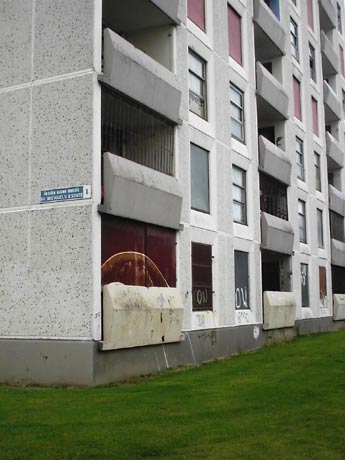
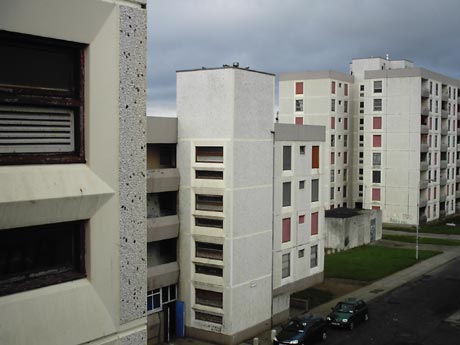
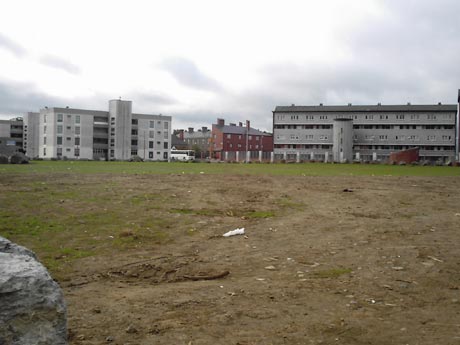
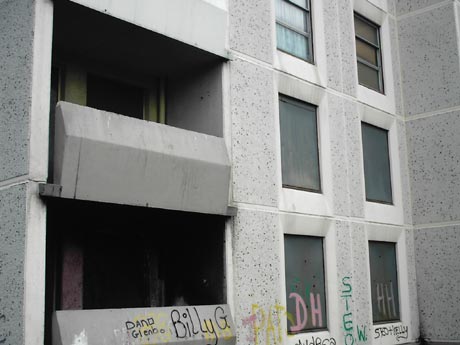
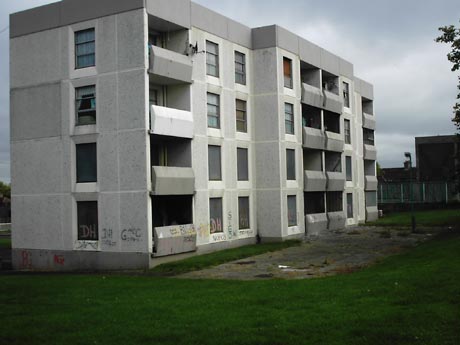
 printable version
printable version

 Digg this
Digg this del.icio.us
del.icio.us Furl
Furl Reddit
Reddit Technorati
Technorati Facebook
Facebook Gab
Gab Twitter
Twitter
View Full Comment Text
save preference
Comments (13 of 13)